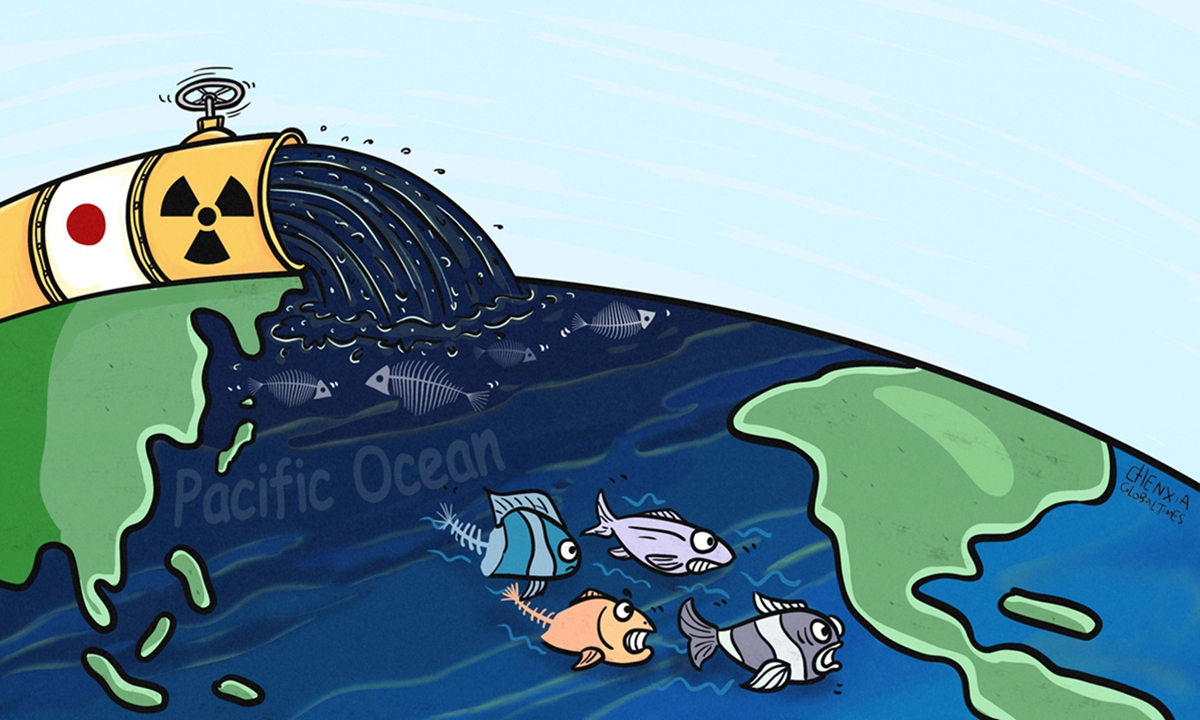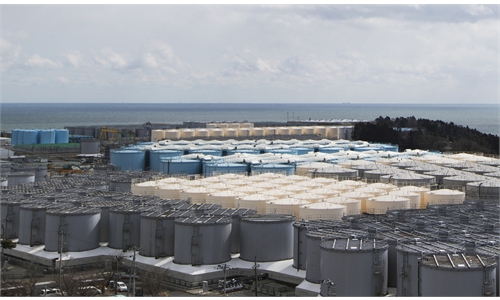Japan will have new historical stain by dumping nuclear-contaminated water in Pacific: Global Times editorial

Illustration: Chen Xia/GT
Japan's Nuclear Regulation Authority held a meeting on Friday, which formally approved Tokyo Electric Power Company (TEPCO)'s plan of dumping nuclear-contaminated water from the Fukushima nuclear power plant into the sea. This is a key step in Japan's insistence on pushing for the discharge of the nuclear-contaminated water into the sea regardless of the concerns of all parties.
Next, as long as the consent of local governments such as the one in Fukushima is obtained, TEPCO will officially start building the necessary facilities, such as an undersea tunnel. Without fully consulting and reaching an agreement with stakeholders and relevant international institutions, if Japan forcibly starts the dumping process, it will definitely pay a price for its irresponsible behavior.
In terms of the handling of the Fukushima nuclear disaster, the credibility of TEPCO has long been bankrupt. If it wasn't for TEPCO's missteps for the sake of money-saving, the accident could not have been as severe as level 7, the highest in human history. After the accident, it was exposed that TEPCO had been a repeat offender in the concealing and manipulation of data.
Under the indulgence and umbrella of the Japanese government, the company often muddled through by simply apologizing. In terms of the legitimacy of the water dumping plan, the reliability of Japanese data, the effectiveness of purification devices, and the uncertain environmental impact, TEPCO and the Japanese government have never made clear statements. Any wish to rely on them to eliminate hidden dangers through self-examination and self-correction is tantamount to an illusion.
With regard to the nuclear-contaminated water discharge plan, TEPCO and the Japanese government have been extremely "low-key" in notifications about the progress. To put it bluntly, this kind of "low-key" manner in fact shows a sneaky guilty conscience, or extreme selfishness - they try to blind others whenever they can. When they cannot fool others, they will simply go their own way forcibly.
Japan has repeatedly claimed that it has no alternative to dumping the nuclear-contaminated water into the sea, trying to leave the international community with an aggrieved and hard-working image. But the fact is that many nuclear scientists have proposed better ways. The truth is that the plan to dump the water into the sea is the cheapest. If there was a ranking of exquisite egoists, TEPCO and the Japanese government would be the leading figures.
To dispel the doubts of the international community, Japan has repeatedly claimed that the contaminated water containing small amounts of tritium is safe. Former Japanese prime minister Yoshihide Suga hesitated for a long time in front of the camera, and finally did not dare to drink the diluted nuclear contaminated water - the scene is still fresh in many people's memories.
Japanese politicians cannot even stage a political show, let alone make a strict scientific argument. The statement that the harm could be reduced through dilution by seawater is even more self-deceiving, because no matter how much the radioactive element is diluted, it will not disappear. The subtext of such a statement is - the loss will be shared by all human beings.
The disposal of contaminated water from the Fukushima nuclear power plant concerns the global marine environment and the public health of Pacific Rim countries. It is by no means the private business of Japan. But people have noticed that as long as Washington gives a signal of acquiescence or even approval, Japan will dare to take the plunge. Washington believes that the location of the release of contaminated water is far from US soil and seems to have nothing to do with the US, thus it has made a shameful deal with Japan. By condoning Japan's dumping, the US wants in exchange to gain Japan's geopolitical cooperation and allegiance. US Secretary of State Antony Blinken even thanked Japan for its "transparent efforts" in its decision to dispose of the contaminated water, and it is staggering how he has disregarded the facts.
This has made the world more aware of the US' and the West's shocking double standards: They believe Chinese people are being harmful to the environment even by eating meat, while Japan's dumping of nuclear-contaminated water into the Pacific Ocean is regarded as so-called safe and responsible. It is conceivable that if the same thing happened in China, the spittle from US and Western public opinion could raise the sea level of the Pacific by one meter.
However, the Pacific Ocean is not Japan's sewage disposal site, and the marine ecology is an organic whole, so once the pollution spreads, it may affect the entire body. Most countries, including the US, cannot be immune to it. A German oceanic research institute earlier pointed out that as the Fukushima coast has one of the strongest ocean currents in the world, the radioactive materials will pollute more than half of the Pacific Ocean in 57 days from the date of discharge, and will spread to the global waters 10 years later. Nuclear experts from environmental group Greenpeace pointed out that the carbon-14 contained in the contaminated water has a life of thousands of years and has the potential to damage human DNA.
The Fukushima nuclear leak was one of the severest-level nuclear leaks in human history. Without an independent and thorough safety inspection, Japan has no right to arbitrarily decide to discharge nuclear-contaminated water into the Pacific Ocean. If Japan forcibly turns a blind eye to the concerns from the international community, the moment when the Fukushima nuclear-contaminated water flows into the sea, a new historical stain will follow Japan thereafter forever. And the stain won't ever be washed off even by the entire Pacific Ocean.

